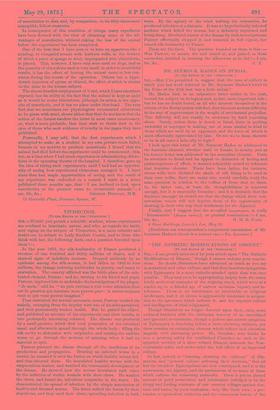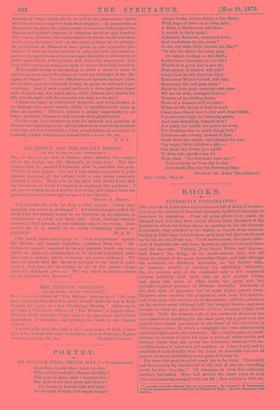"THE /ESTHETIC MODIFICATIONS OF DISSENT." go THE EDITOR OF THE
"SPECTATOR.')
SIR,—I am greatly interested by your article upon "The lEsthetic Modifications of Dissent," though I cannot endorse your conclu- sions. No doubt Dissenters have advanced as much as you say in esthetical and other culture, and that they therefore sympathise with Episcopacy in a more catholic-minded spirit than was once possible. They may even be appropriating largely from the many lovely esthetical examples of the reigning creed, which were as a scarlet rag to a blinder age of narrow sectarian bigotry and in- tolerance. There is no intolerance so intolerable as religious intolerance, and it of course is aggressively intolerant in propor- tion to the ignorance which induces it, and the superior culture and intelligence of rival religionists.
Though Dissenters no longer descend upon their, once, more cultured brethren with the barbarian war-cry of an uncivilised and ignorant sectarianism, though a jealous and narrow suspicion of Episcopacy is dissolving before a more elevating criticism, yet there remains an estranging element which culture and education magnify with increasing power. He, therefore, who thinks he sees a growing safety for established Churches as such in the apparent security of a more refined Dissent, misreads the Non- conformist spirit, and under-rates the full effect of an improved culture.
So fast, indeed, is "learning elevating the criticism" of Dis- senters, and "general culture softening their doctrine," that all but the broadest Episcopalians are now outstripped, and it is the narrowness, the bigotry, and the pretensions of so many of them which enflame the remaining animosity. There is yet an absurd amount of petty persecution and intolerance indulged in by the clergy and leading residents of our country villages against doc- trine and tastes, by your confession, very like their own ; a pre- tension to apostolical authority and the consequent heresy of the teachers of other creeds which, as well as the persecution, derive all their pretence to power from State support. In proportion as Dissenters rise above the paltry arena of sectarian bickerings to the highest and noblest purposes of religions devotion and practice, they resent, of course, the secular authority which, on the one hand, weakens by ita fetters, and on the other, poisons by its prestige. In proportion as Dissenters have given up the aggressive pro- trusion of their particular notions of religious truth and practice, and see the good fruits of reticence and liberality in all matters of detail upon which Christendom will never be unanimous, they look with increasing suspicion upon all that a Stale faith involves.
Who would dream of attempting to word a creed or form of service so as to meet the wishes or even the tolerance of the dis- ciples of Dissent ? Yet the differences of opinion amongst them are as little, and the brotherly feeling as great, as amongst Epis- copalians. And if such a creed and such a form had been found and adopted, say, ten years since, could Dissent have shown the life, the strength, and the progress one may see to-day?
I think the State is sufficiently impartial and even-handed in its dealings with moral creeds, whilst it interferes with them as little as possible. When it extends a similar impartiality to all faiths, probably Dissenters will express their gratification.
For the rest, it is satisfactory that the attitude and position of Dissent are beginning to be rightly affirmed as something worthies —though not less formidable—than an exhibition of animosity or unkindly rivalry towards any honest faith.—I am, Sir, &c., V. J. C.



































 Previous page
Previous page